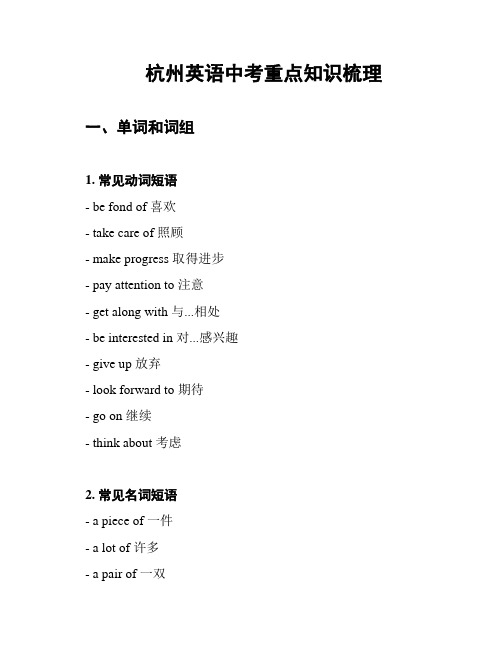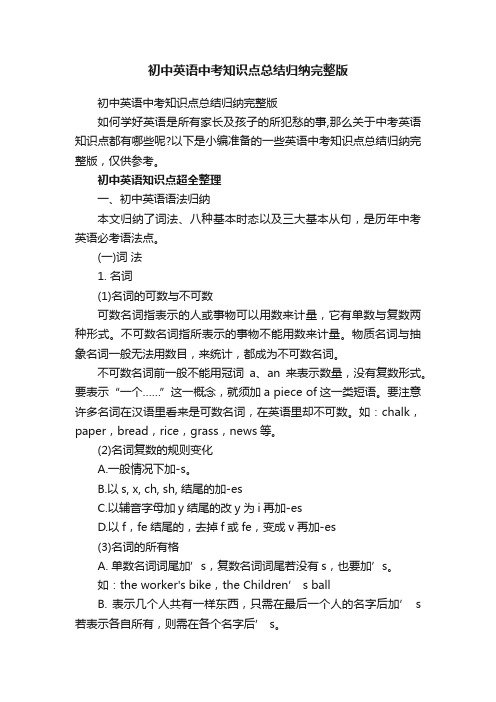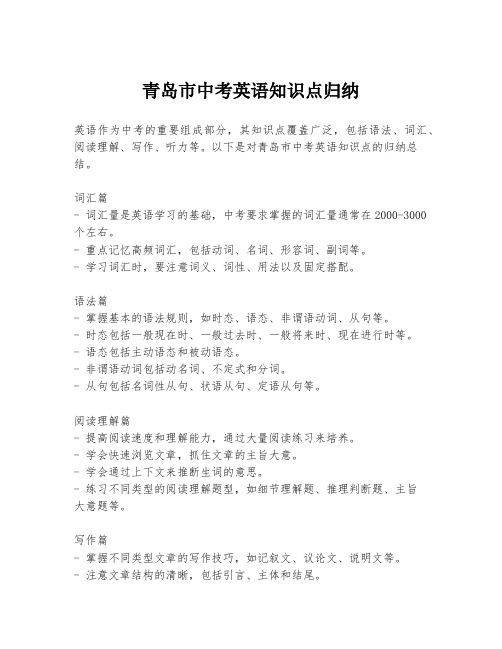中考英语重点知识解析
杭州英语中考重点知识梳理

杭州英语中考重点知识梳理一、单词和词组1. 常见动词短语- be fond of 喜欢- take care of 照顾- make progress 取得进步- pay attention to 注意- get along with 与...相处- be interested in 对...感兴趣- give up 放弃- look forward to 期待- go on 继续- think about 考虑2. 常见名词短语- a piece of 一件- a lot of 许多- a pair of 一双- a few 几个- a little 一点- a number of 许多- a bit of 一点- a great deal of 大量的- a majority of 大多数- a large amount of 大量的二、语法知识1. 时态- 一般现在时:表示经常性的动作或客观真理。
如:I go to school every day.- 现在进行时:表示正在进行的动作。
如:She is reading a book now.- 一般过去时:表示过去某个时间发生的动作或状态。
如:I visited my grandparents last weekend.- 过去进行时:表示过去某个时间正在进行的动作。
如:She was cooking dinner at 7pm yesterday.- 一般将来时:表示将来某个时间将要发生的动作。
如:I will go to the party tomorrow.2. 句型- 肯定句:主语 + 动词 + 宾语。
如:She reads books.- 否定句:主语 + 动词 + not + 宾语。
如:She does not read books.- 一般疑问句:助动词 + 主语 + 动词 + 宾语?如:Do you read books?- 特殊疑问句:疑问词 + 助动词 + 主语 + 动词 + 宾语?如:What do you do?三、阅读理解技巧1. 题型解析- 主旨题:根据文章的大意选择答案。
2023中考英语重点知识归纳笔记

一.英语语法重点与难点1、as…as…结构:你和汤姆是一样好的孩子。
You’re a boy as good as Tom.=You’re as good a boy as Tom.2、(1)too…to与so…that sb. can’t…的句型转换:前者为简单句,主语只有一个,而后者为复合句,主语有两个,试比较:The man was too angry to be able to speak.The man was so angry that he wasn’t able to speak.(2) too…to…与not enough to句型的转换:He is too young to get married.=He is not old enough to get married.The book is too difficult for me to read.=The book is not easy enough for me to read.3、形容词原级表示比较级含义:约翰不象迈克那么苯。
John is not so stupid as Mike.John is less stupid than Mike.John is cleverer than Mike.4、用比较级表示最高级:约翰是班里最高的男生。
John is taller than any other boy in the class.John is the tallest boy in the class.5、the more….. the more….表示“越……越……”:The more books you read, the wider your knowledge is.The more food you eat, the fatter you are.6、more and more….表示“越来……越……”:More and more students realized the importance of a foreign language.Our country is getting stronger and stronger.二.中考考点—词组1. after, in 这两个介词都可以表示“……(时间)以后”的意思after 以过去为起点,表示过去一段时间之后,常用于过去时态的句子中?如:She went after three days. 她是三天以后走的in 以现在为起点,表将来一段时间以后,常用于将来时态的句子中如:She will go in three days. 她三天以后要走2. how long, how often, how soonhow long指多长时间,主要用来对一段时间(如three days, four weeks 等)提问?如:How long ago was it? 这是多久前的事了?how often指每隔多久,主要用来对频率副词或状语(如once a week等)提问?如:—How often does he come here? —Once a month. 他(每隔)多久来一次?每月一次。
史上最全的中考英语语法知识点归纳

史上最全的中考英语语法知识点归纳一、词类和词性1.名词:可数名词、不可数名词、专有名词2.代词:人称代词、物主代词、反身代词、指示代词、不定代词、疑问代词、关系代词3.形容词:形容词的基本用法、比较级和最高级4.副词:副词的基本用法、比较级和最高级5.动词:动词的五种形式、时态、语态、情态动词、动词的非谓语形式6.连词:并列连词、从属连词、状语从句引导词7.介词:基本介词及其用法、固定介词短语8.冠词:不定冠词、定冠词、零冠词9.数词:基数词、序数词、分数词、倍数词10.感叹词:常见感叹词二、句子结构1.句子成分:主语、谓语、宾语、定语、状语、补语2.主谓一致:主语和谓语在人称和数上保持一致3.句型转换:陈述句、疑问句、祈使句、感叹句的转换4.句子的简单句、并列句、复合句、复合句类型(定语从句、状语从句、宾语从句)三、时态和语态1.一般现在时2.一般过去时3.现在进行时4.过去进行时5.一般将来时6.一般过去将来时7.现在完成时8.过去完成时9.现在完成进行时10.一般过去完成进行时11.被动语态四、非谓语动词1.不定式2.动名词3.动词-ing形式五、虚拟语气1.与事实相反的虚拟语气:与现在事实相反的虚拟语气、与过去事实相反的虚拟语气2.与将来事实相反的虚拟语气3.与现在条件相反的虚拟语气4.与过去条件相反的虚拟语气六、定语从句1.关系代词引导的定语从句2.关系副词引导的定语从句3.定语从句的嵌套七、状语从句1.时间状语从句2.地点状语从句3.方式状语从句4.原因状语从句5.条件状语从句6.比较状语从句7.目的状语从句8.结果状语从句八、宾语从句1.宾语从句的引导词2.宾语从句的位置九、名词性从句1.主语从句2.宾语从句3.表语从句十、情态动词1.can和could2.may和might3.will和would4.shall和should5.must和have to6.need和dare以上是中考英语语法知识点的简要归纳,更详细的内容需要根据课本和学习资料进行学习和理解。
初中英语中考知识点总结归纳完整版

初中英语中考知识点总结归纳完整版初中英语中考知识点总结归纳完整版如何学好英语是所有家长及孩子的所犯愁的事,那么关于中考英语知识点都有哪些呢?以下是小编准备的一些英语中考知识点总结归纳完整版,仅供参考。
初中英语知识点超全整理一、初中英语语法归纳本文归纳了词法、八种基本时态以及三大基本从句,是历年中考英语必考语法点。
(一)词法1. 名词(1)名词的可数与不可数可数名词指表示的人或事物可以用数来计量,它有单数与复数两种形式。
不可数名词指所表示的事物不能用数来计量。
物质名词与抽象名词一般无法用数目,来统计,都成为不可数名词。
不可数名词前一般不能用冠词a、an来表示数量,没有复数形式。
要表示“一个……”这一概念,就须加a piece of这一类短语。
要注意许多名词在汉语里看来是可数名词,在英语里却不可数。
如:chalk,paper,bread,rice,grass,news等。
(2)名词复数的规则变化A.一般情况下加-s。
B.以s, x, ch, sh, 结尾的加-esC.以辅音字母加y结尾的改y为i再加-esD.以f,fe结尾的,去掉f或fe,变成v再加-es(3)名词的所有格A. 单数名词词尾加’s,复数名词词尾若没有s,也要加’s。
如:the worker's bike,the Children’ s ballB. 表示几个人共有一样东西,只需在最后一个人的名字后加’ s 若表示各自所有,则需在各个名字后’ s。
如:This is Lucy and Licy’ s room.These are Kate's and jack’ s rooms.C. 如果是通过在词尾加—s构成的复数形式的名词,只加’。
如:the students’ books,the girls’ blouses(另外:名词+of+名词名词是有生命的,我们就用’s结构来表示所有关系。
如果名词所表示的事物是无生命的,我们就要用名词+of+名词的结构来表示所有关系。
初中英语中考必考知识点

初中英语中考必考知识点一、语法知识(一)名词1. 可数名词与不可数名词可数名词有单复数形式。
复数形式的构成规则有:一般在词尾加 -s,如book books。
以s, x, ch, sh结尾的词加 -es,如box boxes。
以辅音字母 + y结尾的词,变y为i加 -es,如city cities;但以元音字母+y 结尾的词,直接加 -s,如day days。
以f或fe结尾的词,变f或fe为v加 -es,如knife knives,但也有一些词直接加 -s,如roof roofs。
不可数名词没有复数形式,常见的不可数名词有:water, milk, air, food(表示食物的总称时)等。
2. 名词所有格有生命的名词所有格:一般在词尾加's,如Tom's book。
以s结尾的复数名词,只加',如the students' classroom。
表示两者或两者以上共同拥有时,只在最后一个名词后加's;表示各自拥有时,每个名词后都加's。
例如:Lucy and Lily's mother(她们共同的妈妈);Lucy's and Lily's rooms(她们各自的房间)。
无生命的名词所有格常用“of + 名词”结构,如the window of the room。
(二)代词1. 人称代词主格:I, you, he, she, it, we, you, they,在句中作主语。
例如:I like English.宾格:me, you, him, her, it, us, you, them,在句中作宾语。
例如:He helps me.2. 物主代词形容词性物主代词:my, your, his, her, its, our, your, their,后面要接名词。
例如:This is my book.名词性物主代词:mine, yours, his, hers, its, ours, yours, theirs,相当于“形容词性物主代词+名词”。
最新中考英语语法必考知识点归纳

最新中考英语语法必考知识点归纳中考英语语法部分是考试中的重点,需要考生掌握和熟悉各种语法知识点。
以下是最新中考英语语法必考知识点的归纳:一、时态1.现在时态:表示现在的动作或状态。
2.过去时态:表示过去发生的动作或状态。
3.将来时态:表示将来要发生的动作或状态。
二、动词1.动词的五种形式:原形、第三人称单数形式、过去式、过去分词、现在分词。
2.动词的时态和语态变化:一般时、进行时、完成时、被动语态。
三、名词1.可数名词和不可数名词的区别以及在句子中的用法。
2.单数名词和复数名词的区别以及在句子中的用法。
四、冠词1.定冠词和不定冠词的用法及其区别。
五、代词1.人称代词:主格、宾格、物主代词、反身代词。
2. 指示代词:this、that、these、those。
3. 不定代词:some、any、no、every、each等。
六、形容词和副词1.形容词的用法及其在句子中的位置。
2.形容词的比较级和最高级的构成及用法。
3.副词的用法及其在句子中的位置。
七、介词1.常见的介词及其用法。
2.介词短语在句子中的作用。
八、连词1.并列连词及其连接的句子。
2.从属连词及其连接的句子。
九、虚拟语气1.虚拟语气的用法及其在条件句中的表示。
十、直接引语和间接引语1.直接引语和间接引语的区别及其在句子中的用法。
十一、固定搭配和常见短语1.固定搭配和常见短语的用法及其在句子中的位置。
以上是最新中考英语语法必考知识点的归纳,考生需要通过学习和积累这些知识点,提升自己的语法水平,从而在考试中取得好成绩。
2024年中考英语-考纲重点语法必背

考纲重点语法必背一、考纲重点语法总结(一)一.词类(Parts of Speech)名词英文名称The Noun(缩写为n.)表示人或事物的名称例词boy,clock,book等冠词英文名称The Article(缩写为art.)用在名词前帮助说明名词所指的人和或事物。
例词a(an),the代词英文名称The Pronoun(缩写为pron)用来代替名词、形容词或是数词例词we,that,his,what形容词英文名称The Adjective(缩写为adj.)用以修饰名词,表示人或事物的特征例词old,red,fine,good.数词英文名称The Numeral(缩写为num.)表示数量或是顺序。
例词one,thirteen first动词英文名称The Verb(缩写为v.)表示动作或状态。
例词sit,go,be(am,is,are)副词英文名称The Adverb(缩写为adv.)修饰动词、形容词或其他副词。
例词not too,here,very介词英文单词The Preposition(缩写为prep.)表示名词、代词等和句中其他词的关系。
例词in,on,of,to,under.连词英文单词The Conjunction(缩写为conj.)用来连接词与词、短语与短语或句与句。
例词and,or,but.感叹词英文单词The Interjection(缩写为interj.)表示说话时的喜悦、惊讶等情感。
例词oh,hello,hi,er.二.名词(Nouns)1.总的说来,名词分专有名词和普通名词两类。
专有名词:表示具体的人,事物,地点或机构的专有名称。
Lucy China中国Asia亚洲Beijing北京。
专有名词的第一个字母要大写。
普通名词:表示某些人,某类事物,某种物质或抽象概念的名称。
例如:teacher老师tea茶reform改革普通名词又可进一步分为四类1)个体名称:表示单个的人和事物。
青岛市中考英语知识点归纳

青岛市中考英语知识点归纳英语作为中考的重要组成部分,其知识点覆盖广泛,包括语法、词汇、阅读理解、写作、听力等。
以下是对青岛市中考英语知识点的归纳总结。
词汇篇- 词汇量是英语学习的基础,中考要求掌握的词汇量通常在2000-3000个左右。
- 重点记忆高频词汇,包括动词、名词、形容词、副词等。
- 学习词汇时,要注意词义、词性、用法以及固定搭配。
语法篇- 掌握基本的语法规则,如时态、语态、非谓语动词、从句等。
- 时态包括一般现在时、一般过去时、一般将来时、现在进行时等。
- 语态包括主动语态和被动语态。
- 非谓语动词包括动名词、不定式和分词。
- 从句包括名词性从句、状语从句、定语从句等。
阅读理解篇- 提高阅读速度和理解能力,通过大量阅读练习来培养。
- 学会快速浏览文章,抓住文章的主旨大意。
- 学会通过上下文来推断生词的意思。
- 练习不同类型的阅读理解题型,如细节理解题、推理判断题、主旨大意题等。
写作篇- 掌握不同类型文章的写作技巧,如记叙文、议论文、说明文等。
- 注意文章结构的清晰,包括引言、主体和结尾。
- 使用恰当的连接词来使文章更加流畅。
- 注意语法和拼写的正确性。
听力篇- 通过听力练习来提高对英语口语的理解能力。
- 练习不同类型的听力题目,如对话理解、短文理解、信息捕捉等。
- 注意听力材料中的关键词和信号词。
口语篇- 虽然口语不是中考的必考项目,但练习口语可以加深对语言的理解和运用。
- 通过角色扮演、小组讨论等方式来练习口语。
复习策略篇- 制定合理的复习计划,均衡分配时间给各个知识点。
- 通过做历年真题来熟悉考试题型和难度。
- 及时总结和复习错题,避免在相同问题上重复犯错。
结束语:青岛市中考英语知识点的掌握需要系统的学习和大量的练习。
希望以上的归纳能够帮助学生们更好地复习和准备中考,取得理想的成绩。
记住,持之以恒的努力和正确的学习方法是成功的关键。
- 1、下载文档前请自行甄别文档内容的完整性,平台不提供额外的编辑、内容补充、找答案等附加服务。
- 2、"仅部分预览"的文档,不可在线预览部分如存在完整性等问题,可反馈申请退款(可完整预览的文档不适用该条件!)。
- 3、如文档侵犯您的权益,请联系客服反馈,我们会尽快为您处理(人工客服工作时间:9:00-18:30)。
中考英语重点知识解析一,动词过去式与过去分词。
1.AAA型:cut cut cutset, put, shut, bet, hurt,hit, read2.ABC型:see saw seenbreak, wear, take, do, give, go, rise, speak3.ABB型:sell sold soldCatch, hear, tell, have, make, send, lose, meet, sweep, find, buy, leave, get, forget 4.ABA型:come, came, come二,动词后加to do 和加doing的区别。
try doing stop doing forget doing remember doingtry to do stop to do forget to do remember to do三,关于数词倍数的表达。
倍数+adj./adv.+than 比....更加多少倍倍数+as+adj./adv+as.... 是...的多少倍I have twice as many books as you do.I have twice more books than you do.四.Say,talk, speak, tell 的区别。
See, look, watch, seem 的区别。
Listen, listen to, sound, hear 的区别。
Family,room, home, house, flat 的区别Work,job, task,profession的区别。
Sometime, some time, some times, sometimes 的区别。
Like, be like, look like的区别例:1.Kate will be back ___ in February.A, some time B, sometime C, some times D, sometimes2.He will ___ at the meeting but I don’t know what he will ___.A, speak; say B, say; speak C, tell; speak D, talk; say3.He ___ around but ___ nothing.A, look; see B, looked; see C, looked; saw D, watched; seem4.Tom regards Nanjing as his second___ because he has been here for over ten years. A, family B, home C, room D, house5.-What does your sister___? - She’s ___ my mother.A, look like; like B, like, look like C, look like, look like D, like, like五.used to do 过去常常做某事, be/get used to doing习惯于做某事, be used to do, be used for doing被用于做某事例:We often use cotton___ clothes.A, make B, to make C, for make D, to making六.Hear/watch/find/See somebody doing 听见/看见某人正在做某事Hear/watch/find/See somebody do something 听见某人做了某事例:When I got home, I found my mother ___ in the kitchen.A, cook B, cooked C, cooks D, cooking七.现在进行时和过去进行时的区别。
现在完成时和过去完成时的区别。
例:What ___(be) you doing now?What ___ (be)you doing at 7 yesterday evening?Have you been to Beijing?When I arrived at the airport last night, the plane had left.八,被动语态跟各种时态的结合:一般现在时:is/am/are done 一般将来时:will be done一般过去时:was/were done 现在进行时:am/is/are being done现在完成时:have/has been done 过去进行时was/were being done注意:begin, start, open, close, end, stop, finish, move, pass, drive,change等词,用主动形式表被动。
例:School begins in September.The shop __A at 8 a.m. and it ____ for ten hours every day.A, opens; is open B, is opened; opens C, is open; has openedD, opened; opens巩固练习题:一,用括号中所给动词的适当形式填空。
1.I’d like ____(be) your e-friend.2. I want ___(be) an engineer3.My dream is ___(be) a good teacher.4.What about ____(go) for a picnic?5.Why not ___(go) with me?6. Let me ___(help) you.7.You’d better ___(do) it now. 8. I can help you ___(carry) it.9.He is good at ___(swim) and ___(run).10.I look forward to ____(hear) from you soon.11.Don’t ___(laugh) at others. 12. You should___(look) after it.13.I don’t like___(shop). 14. Stop ___(cry)! It’s OK.15.Would you mind my ___(smoke) here?16.You’d better not____(play) here. It’s dangerous.17.My hobbies are ____(collect) stamps and ____(watch) TV.18.Peter is ____(paint) a picture in the park.19.On ___(arrive), he began to work again.20.I hope ____(hear) from you. 21. I learn English by ____(read).22.He sat by the fire,___(read) a book.23.____(see) from the top of the mountain, the village is small.24.Don’t forget ____(turn) off the lights before you go to sleep.25.We should keep it from____(cut) down.26.___(come) and have a look at my new house.27.___(help) yourself to some cakes.28.He used ____(take) a walk after supper, but now he changed his habit.29.He is used to ___(take) a walk after some hard work.30.In addition to ____(swim), he likes ____(jump) as well.31.I will go ___(fish) tomorrow would you like ___(go) with me?32.Let’s ___(stop) to have a rest. 33. He always makes his sister___(cry).34.Your hair is so long. You need to have it ____(cut).35.Your hair is so long that it needs ____(cut).单项选择重点练习题:1.This is the best way ___ English, I think.A, to learning B, learn C, to learn D, of learn2.It doesn’t look like rain, so you needn’t ____ your umbrella with you. A,fetch B, bring C,push D, get3.Most of the students care much about ___ in the exam.A, fail B, to fail C, failed D, failing4.We won’t go for a trip ___ we have no time next month.We will go for a trip ___ we have no time next month.The baby didn’t go to sleep ___ her mother came back home.A, if B, so C, unless D, until5.I am looking for my pen. I can’t find ___ anywhere.Your pencil-box is so beautiful, I want to buy ___ , too.A, one B, it C, this D, those6.Make sure you ‘ve got the tickets and guidebooks and ____ before you leave. The policemen asked her many questions but she didn’t know____.If you work hard for it, then___ is difficult for you.A, something B, anything C, everything D, nothing7.___ advice he has given me!A.What good B, What a good C, How good D, How a good8.Little Jack was not _____ to pull the girl out of water.A.strongly enough B, enough strongly C, strong enough D, enough strong9.How long can I ___ this book?A, lend B, buy C, borrow D, keep10.She looked sad because what her sister said ___ her feelings.A, damaged B, injured C, destroyed D, hurt11.- Would you like some tea, please? - Yes. I prefer tea___ coffee.A, to B, with C, for D, than12.Attention, please!I have ___ to tell you.A, anything important B,important anythingC, something important D, important something13.Today’s newspaper is well worth___.A, read B, reading C, to read D, to reading14.If it ___ rain tomorrow, we ___ fishing.A, doesn’t; will go B, won’t ; will go C, isn’t; will go D, doesn’t; go15.The news sounds___!A, surprise B, surprised C,surprising D, surprises16.The teacher asked us to ___ the books while having a dictation.A, put off B, put away C, put on D, put out17.It usually takes me half an hour___ English in the morning.A,reading B, read C, to read D, to reading18.Why did she refuse ___ the piano?A, to practice playing B, to practice to play C, practice playing D, practice to play19.Guangzhou has become ____ than before.A, more much beautiful B, much beautifulC, much more beautiful D, most beautiful20.My schoolbag isn’t ___ expensive ___ yours.A, as...as B, as...like C, as...so D, so...so21.-Are your grandparents still___? - Yes. They are both healthy as well.A, live B, living C, life D, alive22.The film was so ___ that I nearly fell asleep.A, bore B, bored C, boring D, bores23.You should stop him ___ making friends with such a bad boy.A, of B, with C, away D, from24.All the students went to school on time, ___ it rained so hard.A, but B, because C, so D, though25.He has to earn lots of money ___ he can buy his children nice food and clothes.A, so that B, such that C, that D, in order26.Children who listened to happy music pointed to the smiling faces, showing that they felt___.A, exciting B, excitedly C, excitement D, excited27.Unfortunately, I did not remember to feed the birds ___ the night before David was going to return.A, until B, before C, as D, since28.I broke my father’s expensive vase. He got quite___.A, angry B, angrily C, anger D, angriest29.Jimmy ___ the Guangzhou Station in an hour.A, arrives at B, gets C, will reach in D, will get to30.Honest children always ___ the truth.A, tell B, talk C, say D, speak31.The magazines mustn’t ___ from the school library.A, take away B, took away C, taken away D, be taken away32.Her article is very good ___ a few spelling mistakes.A,except B, except for C, besides D, beside33.Every morning he___ the bird cage outside, then went to work.A, hang B, hung C, hanged D, hangs34.-Can you catch what the teacher said in the English class?- Sorry, I can ___ understand it.A, hardly B, almost C, nearly D, never35.Tony was ___ TV at 10 yesterday evening.A, looking B, seeing C, reading D, watching36.I miss my family and really feel ___ without any friends in this new city. A, lonely B, lone C, alone D, along。
